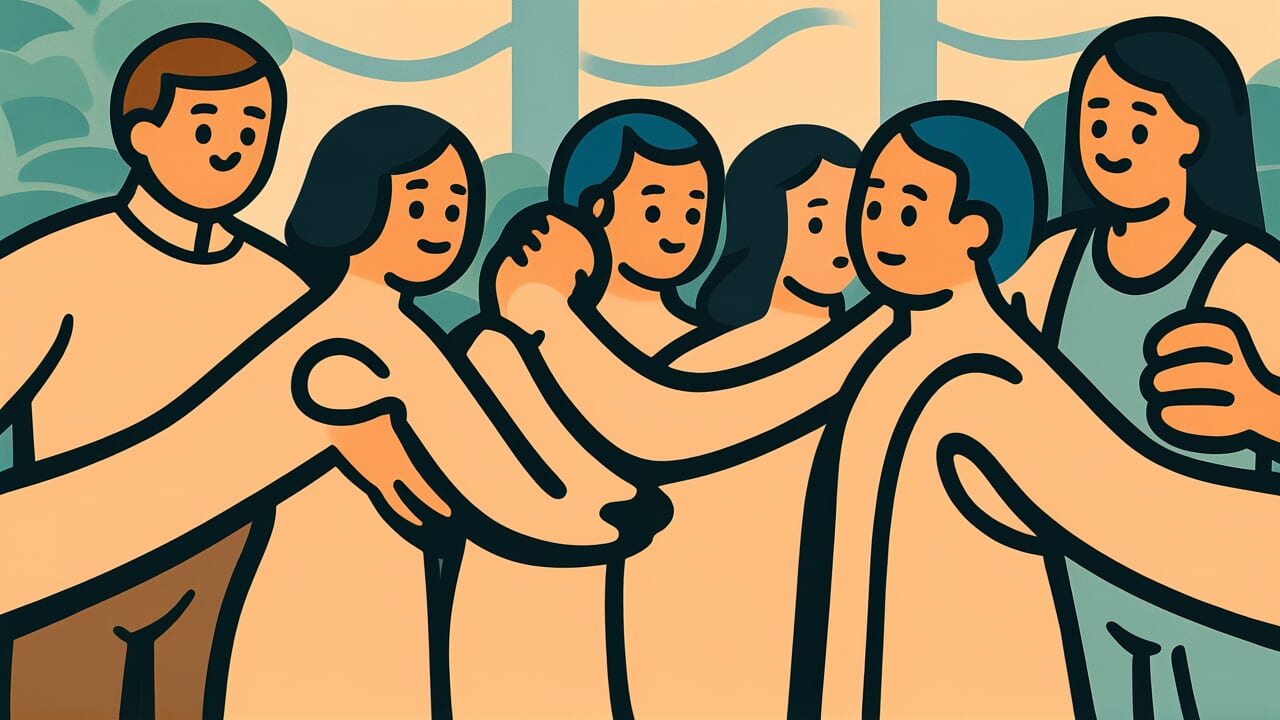How to Read “In unity is strength”
In unity is strength
[in YOO-ni-tee iz strength]
All words use standard pronunciation.
Meaning of “In unity is strength”
Simply put, this proverb means that people accomplish more when they work together than when they work alone.
The literal words are straightforward. Unity means being joined together or working as one. Strength refers to power and ability to get things done. When you combine these ideas, the message becomes clear. Groups of people who cooperate have more power than individuals acting separately.
We use this wisdom in many situations today. Sports teams win games when players work together instead of trying to be stars alone. Workers accomplish bigger projects when they share tasks and support each other. Even families solve problems better when everyone contributes their ideas and effort.
What makes this saying interesting is how it applies everywhere in life. You see it in nature when ants build colonies or birds fly in flocks. You notice it in schools when students help each other learn. The wisdom reminds us that our individual talents become much stronger when we combine them with others.
Origin and Etymology
The exact origin of this specific phrase is unknown, though the idea appears in ancient writings from many cultures. The concept has been expressed in various forms for thousands of years. Early civilizations understood that survival often depended on group cooperation.
This type of saying became important when people lived in small communities that faced constant challenges. Harsh weather, dangerous animals, and food shortages threatened everyone. Groups that worked together had better chances of surviving and thriving. Those who fought among themselves often struggled or failed completely.
The wisdom spread naturally as people shared stories and lessons across generations. Different languages developed their own versions of the same basic truth. The English phrase we know today became popular during times when nations and communities faced major challenges together. It reminded people that their combined efforts could overcome difficulties that seemed impossible alone.
Interesting Facts
The word “unity” comes from the Latin word “unitas,” which means oneness or being joined together. This same Latin root gives us words like “unite,” “uniform,” and “universe.” The concept of strength through cooperation appears in similar phrases across many languages, suggesting people everywhere discovered this truth independently.
Usage Examples
- Coach to team: “We can beat them if we work together – in unity is strength.”
- Union leader to workers: “They can’t ignore us all if we stand together – in unity is strength.”
Universal Wisdom
This proverb captures a fundamental truth about human survival and success that runs deeper than simple cooperation advice. Throughout history, humans have faced a constant tension between individual desires and group needs. Our ancestors discovered that while personal ambition drives innovation and progress, collective action determines whether communities survive or disappear.
The wisdom reveals something essential about human nature itself. We are simultaneously independent creatures who want to make our own choices and social beings who need others to thrive. This creates an ongoing challenge that every generation must solve. Individual talents and ideas provide the raw materials for progress, but without coordination and shared purpose, these gifts remain scattered and weak.
What makes this truth impossible to ignore is how it appears at every level of human experience. Families function better when members support common goals while maintaining their unique personalities. Organizations succeed when employees balance personal growth with team objectives. Even entire societies prosper when citizens contribute their individual strengths to shared challenges like education, security, and economic development. The proverb endures because it addresses the core human reality that our greatest achievements require both personal excellence and collective commitment.
When AI Hears This
When groups work together, something strange happens with how problems affect them. A single person might break under pressure that barely touches a team. The group spreads difficult tasks across many people like a bridge spreads weight. Each person only carries a small piece of the total load. This explains why families survive disasters that destroy individuals living alone.
Humans seem to know this truth without being taught it. Children naturally form groups when facing bullies or hard tasks. Adults create teams, clubs, and partnerships almost automatically when challenges appear. This isn’t just about having more hands to help with work. People instinctively understand that sharing problems makes each problem smaller and less dangerous.
What fascinates me is how humans sacrifice personal freedom for this protection. They follow group rules and share resources even when keeping everything seems smarter. Yet this seemingly foolish choice creates something remarkable. The group becomes nearly impossible to break because it has no single weak point. Individual strength has limits, but shared strength can grow without end.
Lessons for Today
Living with this wisdom means recognizing that true strength comes not from choosing between individual effort and group cooperation, but from skillfully combining both. The challenge lies in contributing your unique talents while supporting others in ways that multiply everyone’s effectiveness. This requires setting aside ego and competition when the situation calls for collaboration.
In relationships and work settings, this understanding changes how we approach conflicts and challenges. Instead of viewing others as competitors for limited resources or recognition, we can see them as potential allies whose different strengths complement our own. This shift in perspective often reveals solutions that seemed impossible when we were thinking only about individual success.
The wisdom scales naturally from personal interactions to larger community involvement. When neighbors face common problems like safety or environmental issues, individual complaints accomplish little. However, when people combine their voices, resources, and efforts, they often discover they have more influence and capability than anyone imagined. The key insight is that unity doesn’t require everyone to be identical or agree on everything. It simply requires enough shared purpose to coordinate individual strengths toward common goals. This ancient wisdom remains practical because it acknowledges both human independence and our fundamental need for each other.



Comments